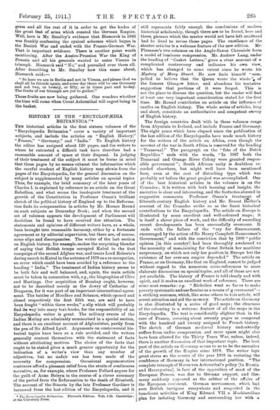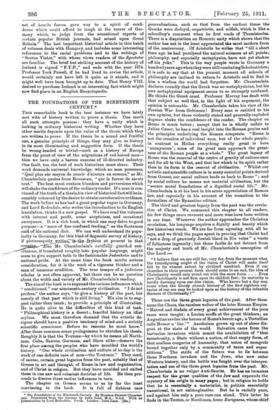HISTORY IN THE " ENCYCLOP/EDIA BRITANNICA."*
THE historical articles in the first sixteen volumes of the "Encyclopaedia Britannica " cover a variety of important subjects, and include the articles on " English History," " France," " Germany," and " India." To English history the editor has assigned about 120 pages, and the writers to whom he entrusted a difficult task have therefore had a reasonable amount of space at their disposal. In judging of their treatment of the subject it must be borne in mind that these pages by no means exhaust the information which the careful student of English history may obtain from the pages of the Encyclopaedia, for the general discussion on the subject is supplemented by many articles on special topics. Thus, for example, the brief summary of the later years of Charles L is explained by reference to an article on the Great Rebellion, and what seems the inadequate treatment of the growth of the Constitution in Professor Oman's brilliant sketch of the political history of England up to the Reforma- tion finds its compensation in articles by Mr. Horace Round on such subjects as Domesday Book ; and when the second set of volumes appears the development of Parliament will doubtless be found to have received due attention. The statements and opinions of different writers have, as a whole, been brought into reasonable harmony, either by a fortunate agreement or by editorial supervision, but there are, of course, some slips and discrepancies. The writer of the last section on English history, for example,makes the surprising blunder of saying that British troops occupied Kabul in the first campaign of the second Afghan war, and treats Lord Roberts's daring march to Kabul in the autumn of 1879 as a re-occupation, an error which could have been avoided by a reference to the heading " India." The treatment of Indian history seems to be both fair and well balanced, and, again, the main article must be taken in connection with, e.g., the biographies of Clive and Hastings. Our acquisition of Bombay ought, however, not to be described merely as the dowry of Catherine of Braganza, for it was part of an important international agree- ment. The battles of Moodkee and Sobraon, which opened and closed respectively the first Sikh war, are said to have been fought " within three weeks," a slip which will probably find its way into many text-books, for the responsibility of an Encyclopaedia writer is great. The military events of the Indian Mutiny are admirably summarised in a special section, and there is an excellent account of Afghanistan, partly from the pen of Sir Alfred Lyall. Arguments on controversial his- torical topics have been as a rule avoided, and the writers generally content themselves with the statement of facts without attributing motives. The choice of the facts that ought to be stated gives a much greater opportunity for the indication of a writer's view than any number of adjectives, but no unfair use has been made of the
necessity for compression. Occasional argumentative sentences afford a. pleasant relief from the strain of continuous narrative, as, for example, where Professor Pollard argues for the guilt of Anne Boleyn in the course of a, clever summary of the period from the Reformation to the death of Elizabeth. The account of the Stuarts by the late Professor Gardiner is borrowed from the last edition of the Encyclopasdia, and it
The Enevelepadis Britannica. Eleventh Edition. vole. 1-18. Cambridge : at the University Press
still represents fairly enough the conclusions of modern historical scholarship, though there are to be found, here and there, phrases which the master would not have left unaltered
had be lived to revise these pages. The excellence of the shorter articles is a welcome feature of the new edition. Mr.
Plummer's two columns on the Anglo-Saxon Chronicle form a model of luminous compression. Mr. Andrew Lang, under the heading of " Casket Letters," gives a clear account of a complicated controversy and indicates his own view, which has changed to some extent since he wrote his Mystery of Mary Stuart. He now finds himself " com- pelled to believe that the Queen wrote the whole '+ of the famous Glasgow letter, and abandons his tentative suggestion that portions of it were forged. This is not the place to discuss the question, but the reader will find at least one very important consideration stated for the first time. Mr. Round contributes an article on the influence of castles on English history. The whole series of articles, long and short, constitute an authoritative and competent survey of English history.
The foreign countries dealt with in these volumes range from Abyssinia to Iceland, and include France and Germany. The eight years which have elapsed since the publication of the last edition of the Encyclopedia have made much history for the writers of the article on Africa, even though the account of the war in South Africa is reserved for the heading "Transvaal." The paragraph on the "fate of the Dutch Republics " ends with the words, "In 1907 both the Transvaal and Orange River Colony were granted respon- sible government "; South African unity is doubtless re- corded elsewhere, but might well have been mentioned here, even at the cost of disturbing type which was probably set before the great project was accomplished. One of the best historical articles in the volumes is on the Crusades ; it is written with both learning and insight, the narrative is clear and interesting, and the footnotes abound in suggestive comments. Professor Oman's treatment of fifteenth-century English history and Mr. Ernest Barker's aceount of the Crusades strike us as the finest historical contributions to the Encyclopaedia. The article on Europe is illustrated by some excellent and well-coloured maps ; it is itself a clever piece of work, and the difficulty of recording recent developments has been successfully overcome. It ends with the failure of the "cry for disarmament, encouraged by the action of Sir Henry Campbell-Bannerman's Government," and with the conviction that by 1909 "public opinion [in this country]led been theoughly awakened to the necessity of maaiiiaining for Great Britain her maritime surpremacy, on which not only her position in Europe bet the existence of her over-sea empire depended." The article on France, or on Germany, like that on England, cannot be judged without regard to the numerous cross-references to more elaborate discussions on special topies, and all of these are not yet available. The history of France is told clearly and with spirit, and it makes an excellent work of reference. There are some neat remarks : e.g. " Richelieu went so far as to make poverty systematic and use famine as a means of g wernment"— a striking sentence, which, like some others in tais article, will arrest attention and aid the memory. The article on Germany is also illustrated by a series of good maps ; the clearness of the colouring is a welcome feature of all the maps in the Encyclopedia. The text is considerably slighter than in the case of France, covering about seventy pages as compared with the hundred and twenty assigned to French history. The sketch of German mediaeval history undoubtedly suffers from undue compression, and more space might also have been allowed for the Thirty Years War, unless, indeed,
there is another discussion of that important topic. The best part of the article on Germany seems to us to be the narrative of the growth of the Empire since 1870. The writer lays great stress en the events of the year 1908 in restoring the confidence of Germany in her international position. The complete triumph of Baron von Aehrenthal's policy [in B331114 and Herzegovina], in face of the opposition of Most of the European Powers, was due to German sepport, and Ger- many suddenly aepeared as the arbiter of the affairs of the European continent. German nervousness, which had seen British intrigues everywhere and suspected in the beneficent activities of King Edward VII. a Machiavellian plan for isolating Germany and surrounding her with a net of hostile forces, gave way to a spirit of confi- dence which could afford to laugh at the terror of Ger- many which, to judge from the sensational reports of certain popular British journals, had seized upon Great Britain." The last important historical article in this batch of volumes deals with Hungary, and includes some interesting references to the racial problems and to the writings of " Scotus Viator," with whose views readers of the Spectator are familiar. The brief but striking account of the history of Iceland is signed " F.Y.P.," and ends with the year 1874. Professor York Powell, if he had lived to revise the article, would certainly not have left it quite as it stands, and it might well have been brought up to date. That Henry VIII. desired to purchase Iceland is an interesting fact which might now find place in an English Encyclopcedia.







































 Previous page
Previous page